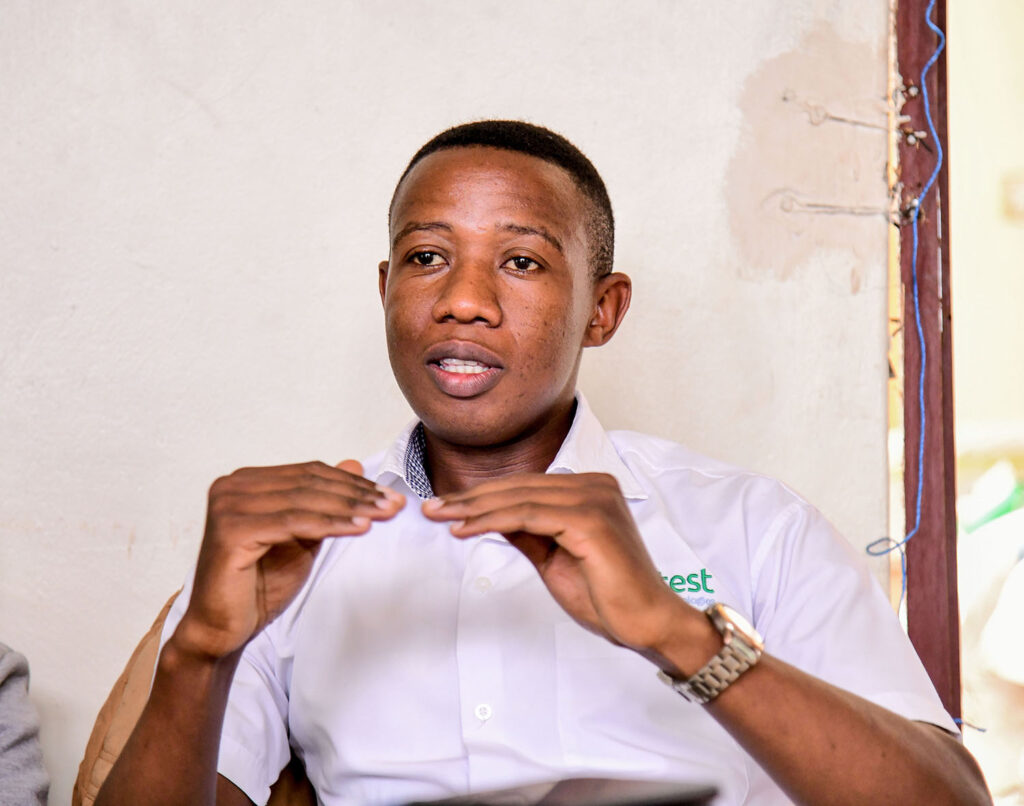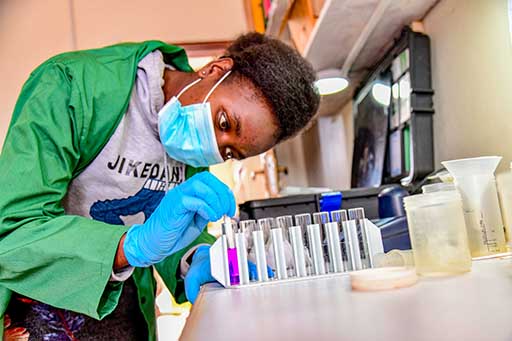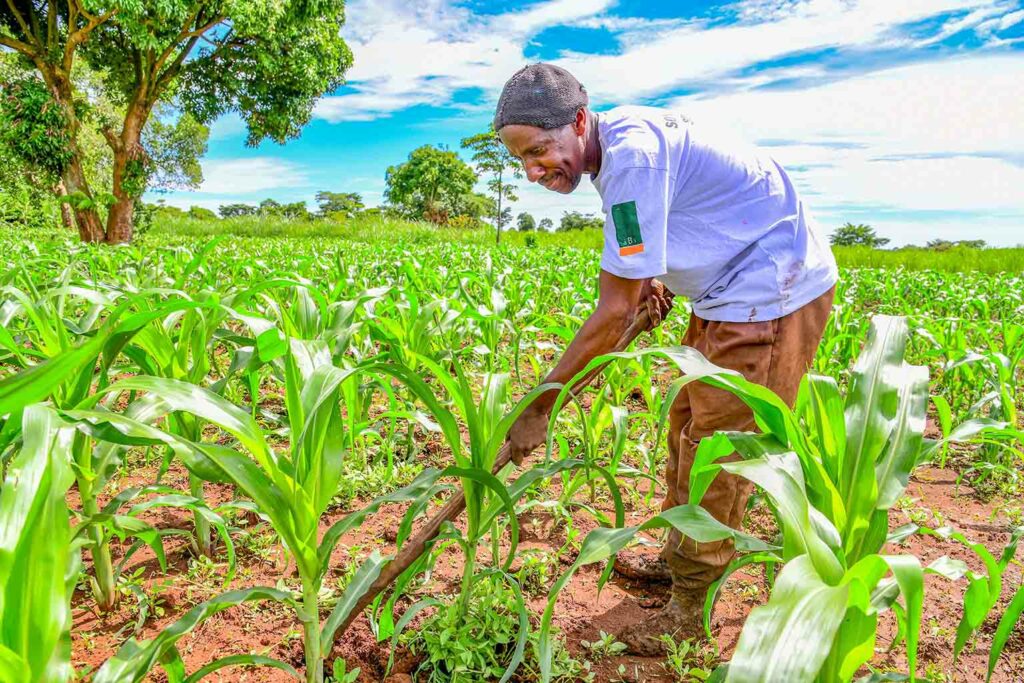aBi-development has supported many farmers countrywide to achieve high yields and earnings. aBi’s focus is to increase agricultural production and value addition by extending matching grants and business development services to agribusinesses, farmer organisations and intermediaries to enhance planning and management. They also support production and business infrastructure, as well as upstream and downstream market linkages of producers and agribusinesses. In a 10-part series, Harvest Money shall carry stories focusing on the success of aBi activities countrywide. In the third story, Herbert Musoke casts the spotlight on Jabba Engineering Ltd who are engaged in soil testing

“The first time the technical people from Jabba Engineering Ltd came to tell us about soil testing, we thought they had a hidden motive of mapping for minerals in our land so they could take it away.”
This is what Elizabeth Ghasinwa the chairperson of Dhibula Atyamye Farmers Group recalls, adding that testing of soil before planting has helped them increase their farm yields. The group is located at Kamirabikomo village, Nambale subcounty in Iganga district.
She says after the training by Jabba Engineering Ltd, they got to know the benefits of testing their soils before cultivating crops, one of which is buying appropriate fertilisers which doesn’t only reduce the cost of reduction but also, increases the yields, by giving the proper nutrients the crops require.
Jabba Engineering Ltd is a grantee under the aBi Green Challenge Fund (GCF) which was set up to address the increasing impacts of climate change on Uganda’s agri-food system. The application process and awarding of grant winners took place between July and November 2022. The challenge was open to private sector agribusinesses, non-government organisations, scientists, researchers and start-ups.
The winning projects are to be implemented between November 2022 and March 2024.
“Our group (Dhibula Atyamye Farmers Group) has been in existence for 10 years, trying to help each other in farming, especially maize and also saving. We save sh2,000 every Saturday and share part of it at the end of year and save the rest,” Ghasinwa explains.
From the savings, they give out loans to members to buy farm inputs like fertilisers, insecticides, herbicides among others inputs which is then deducted after harvest.
“We have a loans and monitoring committee responsible for ensuring whoever is given a loan, has to pay us immediately when they harvest,” she says.
She explains that although they have been working together their production and productivity has been very low but starting last season, when they started working with Jabba Engineering Ltd, their productivity increased drastically.
Establishing the demonstration farm
After being trained by Jabba Engineering in the best agronomic practices of growing maize as a business especially testing the soil and application of fertilisers, but also weeding and post-harvest handling, among others, and they established a demonstration site on half an acre, explains Asuman Mufumbiro, the farm owner.
“The site, the experts selected to establish the demonstration farm, was over used and I was hesitant to clear it. But the experts moved with us step by step starting with testing the soil for fertility and advised on the fertiliser to apply,” he explains.
He says from the half acre demonstration farm, they harvested one ton (1,000) yet before this training, they would only harvest 100kg-300kg.
“This harvest was a clear indication that soil testing is one of the requirements if a farmer wants to get high yields. This season, eight of the 28 members have opted to test their soils before planting and we believe that more will test next season since it is also the bigger season,” he says.
Soil testing is now a must
Hajilah Mutesi a member and a farmer say that, according to what they have witnessed, soil testing is now a must before they plant because it has proved very important if they want to increase production and profits.
“For over 20 years I have been into maize farming, I have never harvested even ten bags from an acre but with proper practices starting with soil testing, I have witnessed harvesting ten bags in half acre where harvesting three bags would be a miracle,” she says.
The group is about to realize it plans
Lazalasi Waiswa the treasurer of the Dhibula Atyamye Farmers Group, says that they have plans that had proved unattainable, because of the low production and productivity but now that they have increased production, they are going to refocus on achieving their dreams.
“As a group, we want to have our processing factory, a tractor and irrigation facilities among others but it had proved so hard for us to afford because whatever we would produce would be only enough for home consumption but now, we see that we can have supply and Jabba has also trained us in finance management which is enabling is to save and invest,” he says.
Soil testing
The company majored in soil testing and then advises farmers on what is needed to increase yields, explains Stephen Ezamukama, a soil scientist working with Jabba Engineering Ltd, Iganga branch.
Ezamukama explains that Jabba engineering Ltd (JEL), is a private limited company established in 2009. It focuses on the productivity of soil by offering quality water and soil testing products and services for improving yields of farmers.
“Farming to can only be profitable if everything is done the right way rather than working on guess work. Every area requires a specific type of fertiliser according to the soils which can only be specified after testing the soils and analysing the soil composition,” he says.
Therefore, soil testing helps you to understand the right fertiliser to apply for high yields and profitability of the farm. Here, you are able to know what particular property is missing or inadequate in the soil that needs to be added more than the other.
“Many farmers just buy and apply fertilizers not knowing which property is much or less needed which makes fertilisers less effective from one garden to the other. This is the reason why one farmer may yield more than the other yet they have both used the same fertiliser like the other,” he says.
Also, it helps you in enterprise selection because after testing the soil, you can then make a good decision on what crop to plant in a particular area according to the soil composition of that area.
“This also saves the costs of production since you will only buy what is required. If you just buy fertilizer without testing the soil, there is a likelihood that you will buy what is not needed in your garden thus the harvest may not be proportionate to the cost of the fertiliser and expected harvest,”says Ezamukama.
He says that farmers should know that if a particular nutrient is in higher quantities than the other, the one in low quantities will be suppressed. This damages the soil.
The soil testing
Farmers may consider soil testing expensive but with the numerous benefits, it turns out to be cheaper than it seems, according to Isabellah Kamwine a laboratory technician at Jabba, Iganga branch.
She adds that, in soil testing, there are three categories (A, B and C). Category A, is called basic testing which is mainly for farmers with common crops like maize, beans, groundnuts, among others. Here they test for majorly three nutrients; nitrogen (n), phosphorus (p) and potassium (k) alongside the pH, which is the acidity or alkalinity of the soil and soil texture which costs sh60,000 per sample.
For category B, in addition to basic testing, they test for more additional minerals (sulphur, magnesium and calcium) that goes for sh80, 000 per sample.
The last one is comprehensive testing which tests for all components both macro and micro nutrients costing sh150,000 per sample.
“The experts pick the samples depending on the features on our land like the topography, vegetation and crops grow like coffee and beans. This is the reason why there are cases where one sample will be picked from five acres and about three are picked from two acres. The average of a sample per 2-3 acres,” she says.
According to Ezamukama, they have laboratories countrywide (Iganga, Gulu, Mubende, Mbale, Bushgenyi and Kampala which is the head office) plus two outlets in Kasese and Kabale to quicken the testing such that in about 24 hours a farmer should be able to get their results and advice on what is required to do. They use two systems; photometric and tabular.
He says for commercial farmers, every time one is going to apply fertilisers, be it top dressing, they have to test the status of their soil before buying the fertiliser but for common farmers they can use one report for a whole year.

Challenges of soil testing in Uganda
Ezamukama explains that the biggest challenge of soil testing services is the mindset of Ugandans including the policy makers who do not appreciate soil testing.
“It has been a struggle to show farmers the good in testing their soils before planting because even the leaders don’t see it as an important aspect of farming. This has made it hard for farmers to embrace the services because it is not incorporated in government’s programmes,” he says.
Working with aBi Development Ltd
Ezamukama explains that started working with aBi in 2017-2018 where they established the Mbale and Kasese labs.
He explains that Jabba Engineering Ltd, has partnered with aBi Development Ltd, as a social enterprise whose focus is to increase agricultural production and value addition by extending matching grants and business development services to agribusinesses and farmer organisations.
“But for the Green Challenge, we have worked with aBi since last year. The partnership intervention will implement a two-year project in 14 districts in Uganda,” he explains.
The purpose of the project is to increase incomes and create employment opportunities to at least 14, 500 small holder farmers dealing beans, maize and coffee value chains through transformational soil nutrition testing and soil management.
All the work relations are geared towards promoting soil testing by farmers as a requirement of boosting yields. Therefore, whatever you see here in this lab, its funds are from aBi because it gives us 60% of the required funds to extend our services to the farmers,” he stresses.
He says they are implementing the project through 60 groups with 25-35 members per group in four districts of Iganga, Bugiri, Namutumba and Bugweri. “But as Jabba we are extending to Jinga, Buikwe and others,’ he adds.
Members in the groups are trained in the best farming practices from soil testing to smart agriculture. Jabba also established a demonstration farm for each group for members to have practical knowledge and skills of the best practices but also advise them about any challenges they face.
“Last year, we only tested the demonstration farm site plus a few members because we had 73 tests but this year in the first season, we have had 152 testing as a result of more members coming to test but also referrals. We believe as we continue, we will see all group members testing their soil,” he says.
Achievements
Ezamukama explains that with funds from aBi Development Ltd, three new laboratories in Iganga, Gulu and Mubende have been established and equipped in addition to enhancement of the main lab at Kampala with fertilizer, tissue and leaf analysis equipment.
Also, they have trained 5,000 smallholder farmers in integrated soil fertility management; soil and water conservation; climate smart agriculture, soil fertility, economics and financial and 200 demonstration farms have been established to enable farmers to get hands-on skills.
Fertiliser selection
Ezamukama explains that, although it is common for farmers to buy NPK as the main fertilizer, there are other forms of fertilizers produced by manufacturers.
According to Ezamukama, farmers are still illiterate of what is contained in fertilizers because even NPK has a variety of variations that a farmer should consider while buying according to the soil requirements but also the stage of the crop.
“We are now trying to stock all types of fertilizers to help farmers get the type they want according to our recommendation but also to help them avoid buying fake fertilizers,” he says.
He stresses that, where farming is headed, it is going to be hard for anyone to any farmer to get the best without soil testing. This is going to be one of the requirements for farming just as it is with quality seeds.






